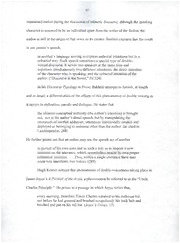Table Of ContentCHR1STIANEROCHEFORTANDTHEDIALOGIC:
VOICESOFTENSIONANDINTENTION
BY
PAMELAFRIESPAINE
ADISSERTATIONPRESENTEDTOTHEGRADUATESCHOOL
OFTHEUNIVERSITYOFFLORIDAINPARTIALFULFILLMENT
OFTHEREQUIREMENTSFORTHEDEGREEOF
DOCTOROFPHILOSOPHY
Copyright2000
by
PamelaFriesPaine
Dedicatedinlovingappreciationtomyhusband,JamesRobertPaine,forallthe
manymonthsofpatience,encouragement,determinedoptimism,andfinancial
support,thatpermittedthesuccessfulcompletionofthisambitiousproject.
ACKNOWLEDGEMENTS
IextendmysincerethankstoCarolMurphy,whochairedmycommitteeandwho
providedvision,guidance,professionalexpertise,andgentleencouragement
throughouttheresearchandwritingprocess.Myappreciationextendstotheentire,
distinguishedcommitteewhosemanyhoursofcarefulreadingandinsightful
suggestionscontributedtothesuccessfulcompletionofthisproject.Iamgratefulto
theUniversityofFlorida'sDepartmentofRomanceLanguagesandLiteraturesfor
providingastimulatingacademicenvironmentthatnurturedmyintellectual
developmentandforofferingfinancialsupportthroughteachingassistantshipsand
tuitionwaivers.IalsowishtoexpressmyappreciationfortheDissertation
FellowshipprovidedtomethroughgenerousfundingfromGaryandNietyGersonto
theUniversityofFlorida'sCollegeofLiberalArtsandSciences.
TABLEOFCONTENTS
page
ACKNOWLEDGMENTS iv
ABSTRACT vi
CHAPTERS
1THETHEORETICALQUESTIONOFVOICEINLITERATURE 1
Notes 29
2OVERVIEWOFROCHEFORT'SWRITINGCAREER 31
Notes 56
3ROCHEFORT'SEARLYNOVELS 57
Notes 106
4ROCHEFORT'SMIDDLEPERIOD 109
Notes 158
5ROCHEFORT'SMATUREFICTION 161
Notes 222
CONCLUSIONS 226
REFERENCES 233
BIOGRAPHICALSKETCH 243
AbstractofDissertationPresentedtotheGraduateSchool
oftheUniversityofFloridainPartialFulfillmentofthe
RequirementsfortheDegreeofDoctorofPhilosophy
CHRISTIANEROCHEFORTANDTHEDIALOGIC:
VOICESOFTENSIONANDINTENTION
By
PamelaFriesPaine
December2000
Chair:Dr.CarolJ.Murphy
MajorDepartment:RomanceLanguagesandLiteratures
Thisdissertationexaminesthenovelisticfictionof20th-centuryFrench
writerChristianeRochefort.Itsthesisisthatanunderstandingofthepresenceand
functioningofvoiceinRochefort'snarrativeisessentialtodiscerningmeaninginher
textsandtoappreciatingthecomplexityandsubtletyofherart.AlthoughRochefort
hasnotyetbeendeemedamajorwriter,oneasimportantasSarrauteorDuras,for
example,thisanalysisoriginatesinaconvictionthatherworkmeritsmorestudyand
recognition.Whileliteraryprizesdistinguishherearlyfictionasthematically
significant,arelativepaucityofpublishedscholarlyanalysisreferencingherlater
workfurthermotivatedthepresentresearch.
Thisdissertationextendstheexistingbodyofcriticalanalysissurrounding
Rochefort'sfictionandpointsoutthat,inadditiontothethematicinterestofher
work,thecomplexityofhernarrativetechniquebringsimportantcontributionstothe
artisticdevelopmentofthenovelasagenre.Inparticular,bycloseexaminationof
voiceinhernovelsonecandeconstructverbalmasksandsubtlemanifestationsof
multipleconsciousnessamongdiversesocialspeechtypesandheterogeneous
perspectives.
VoiceisanessentialstructuralelementthatRochefortappliedinher
writing.Theintroductionprovidesanoverviewofthecriticalquestionofvoiceby
definingtermsandoutliningmajorcontributionstoitstheory.Notingthat
Rochefort'sfictioniscompatiblewithMikhailBakhtin'sdefinitionofthenovelasthe
artisticorganizationofdiverseindividualvoicesandsocialspeechtypes,thisstudy
drawsparticularsupportfromBakhtiniantheoryandterminology.Bothnovelistand
theoristenvisionthenovelasadialogicandpolyphoniccomplexofvoiceswithina
social,historical,andculturalcontext.Thisanalysisdemonstratesthat,infact,
Rochefort'spersonalvisionandindividualartistryresideintherefined,transformed
andreconstitutedfictionalrepresentationofthelanguage,attitudes,tensions,and
intentionsdiscernablewithinthedialogicinteractionofherfictionalnarratorsand
characters.
ThisstudydividesRochefort'sfictionalworkintothreeperiodsinorderto
differentiatehernovelsboththematicallyandstylistically.Closereadingofthe
novelsineachgroup,withparticularfocusonthefunctioningofvoice,offersanew
approachtothewriter'sfiction.Thisstudyalsoprovidesscholarlyanalysisofseveral
textsthathave,untilnow,remainedobscure,misunderstood,andunappreciated.
CHAPTERONE
THETHEORETICALQUESTIONOFVOICEINLITERATURE
"Etl'ecrituren'est-cepasuneconversation?
(ChristianeRochefort,Conversationssansparoles,25)
Voicesofallkindsresonateinbothproseandpoetry:voicesofcharacters,
narrators,andauthors;voicesofhistory,societyandotherliterature;voicesquoted,
mimicked,parodiedandparaphrased.Voicehaslongbeenanimportant
considerationintheappreciationandanalysisofliterature.Asacriticalconcept,the
notionofvoicehashadvariedandinconsistentusage.Thetermhasbeenusedto
differentiateamongcharactersspeaking,narratorsrecounting,andevenauthors'
styles.Generallyspeaking,voicehasbeenusedasametonymforthehuman
presenceevokedthroughthereadingofapoemorstory.Oftenrepresentinga
consciousnessassertingitselfintothatofothers,voicecanfigureimportantlyinthe
formulationofidentityor,inmoderntheoreticalterms,ofsubjectivity.
Thedesiretohaveavoice,toclaimthedominantpositionofspeakingsubject
hasbeennotonlyaprominentthemeinmuchoftwentieth-centuryliterature,buta
motivationformanyofthecentury'snumerouswriters.Togainavoiceistobecome
empoweredsymbolically.Thecentralityofvoiceinliteratureisevidencedbythe
numberofquestionsappurtenanttonarratologyingeneralthattheissueofvoice
inevitablyraises(suchasintention,pointofview,rhetoric,reception,time,place,
truth,reliability,andauthority,forexample).ChristianeRochefort'snovelistic
fictionforegroundstheinterplayofmultiplevoiceswhosedialogicinteractionforms
thebasisforthecreationofnarrativetensionandinterestinhernovels.Herwork,
then,isideallysuitedforanalysisthroughastudyofthepresenceandfunctionof
thosefictionalvoices.
RecognizingvoiceasanessentialstructuralelementthatChristiane
Rocheforthashighlightedinherwriting,thefollowingchaptersexploreitsdifferent
manifestationsinherworkandattempttodetermineitsnatureandfunctioning.The
objectiveofthestudyistoidentifycategoriesofvoicepresentinRochefort'swriting
andtodiscoverthetensionsandintentionalitiesinherentinthosevoicesthat,through
theirdialogicinterfacing,contributetolevelsofmeaningimmanentinhernarrative.
Literature,oftenthesiteofadiscourseofopposition,canfunctiontoincrease
awarenessofthoseminorforcesandvoicesoperatingparadoxicallywithinthe
dominant.Rochefort'skeeninterestinthesubversivepotentialoflanguage,
combinedwithherattentiontomarginalizedindividualsandgroups,makesher
narrativefictionespeciallyappropriateforanin-depthstudyofsomeofthose
insistentvoiceswhich,bytheirtenaciousdeterminationtobeheard,mayspark
futuresocial,political,andartisticchange.Thechallengeforthereaderthenliesin
carefulreadingandanalysisofthediscoursethatisbeingused.AsMichelFoucault
aptlystated,"thequestionisultimately:whatwassaidinwhatwasbeing
smdT'(ArchaeoIogyofKnowledge,40).
Figuringprominentlyandcontroversiallyamongtheconsiderablenumberof
womenwritingandpublishinginthelatterhalfofthetwentiethcentury,Christiane
Rocheforthasleftalegacyofcomplexandchallengingtextsthatmeritattentionboth
forherstylisticsandforhertreatmentoftheme.Despiteprizesofdistinction
awardedtoherworkbyvariousFrenchliteraryagencies,anddespitegrowing
interestinherearlybooksasapointofdepartureforFrenchculturalstudies,
Rochefort'sartisticcontributionremainslargelyunappreciated.Theexaminationof
herworkinthisstudyfocusesonnarrativetechniquewithparticularattentiontothe
treatmentandsignificanceofvoiceinherwritingprojectand.inturn,the
contributionofherworktotheFrenchliterarycanon.
Althoughtheoriesofvoicemaybestudiedfromapsychologicalperspective,
Ichosetofocusmyanalysisonnarratologicalissues,particularlythenotionofvoice
asconceivedbyMikhailBakhtin.Specifically,attentionisgiventothepluralityor
layeringofvoice,itssocially-codednature,anditsdialogicfunctioningwithinthe
text.
Becauseofthenumerousscholarswhohavecontributedtoexplainingthe
complexitiesofnarratologyinfictionalwriting,ahighlyspecializedlexiconhas
evolved.BeforebeginningtheexaminationofvoiceinChristianeRochefort's
fiction,itwouldbeuseful,then,toreviewthedevelopmentoftheconceptofvoiceas
anarratologicaldeviceinordertoclarifyandpositiontermstobeusedinthecourse
ofthediscussion.
Asacategoryinpoetics,theconceptofvoicehasitsrootsinclassicalGreek
aesthetics.InTheRepublic,Socratesusesthetermsdiegesisandmimesisto
distinguishwhetherthepoetisspeakinginhisownvoice,isimitatingthevoiceof
another,orismixingthetwomodes.Mimesisreferstotheimitationorquotingof
speech,whereasdiegesisreferstodirectrecountingortellingofthenarrative.

